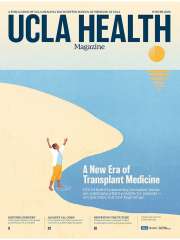UCLA Health Magazine
Features stories, news, research and highlights from the David Geffen School of Medicine at UCLA and UCLA Health.

Winter 2026
View Issue

Summer 2025
View Issue

Winter 2025
View Issue

Fall 2024
View Issue

Spring 2024
View Issue

Winter 2024
View Issue

Fall 2023
View Issue

Spring 2023
View Issue

Winter 2023
View Issue

Fall 2022
View Issue

Spring 2022
View Issue

Winter 2022
View Issue

Fall 2021
View Issue

Spring 2021
View Issue

Winter 2021
View Issue

Fall 2020
View Issue

Summer 2020
View Issue

Winter 2020
View Issue

Fall 2019
View Issue

Summer 2019
View Issue

Winter 2019
View Issue

Fall 2018
View Issue

Spring 2018
View Issue

Winter 2018
View Issue

Fall 2017
View Issue
